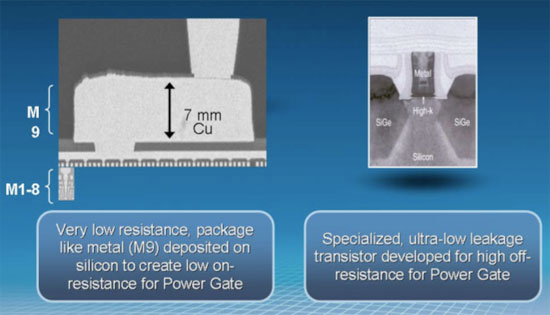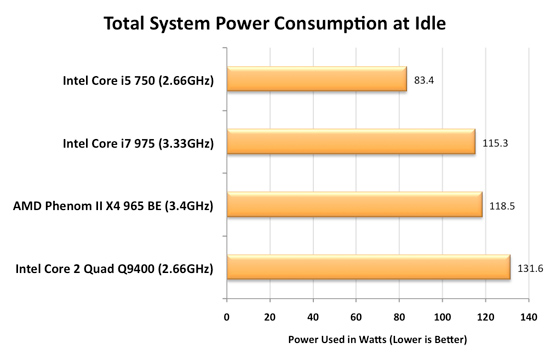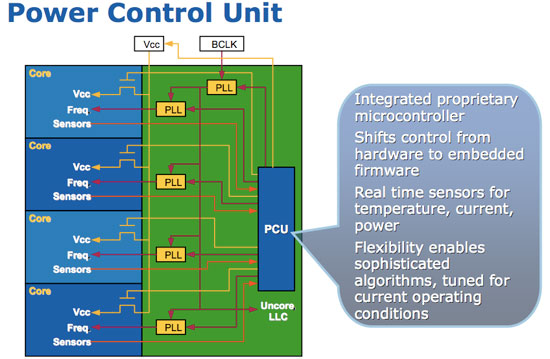Intel's Core i7 870 & i5 750, Lynnfield: Harder, Better, Faster Stronger
by Anand Lal Shimpi on September 8, 2009 12:00 AM EST- Posted in
- CPUs
Homework: How Turbo Mode Works
AMD and Intel both figured out the practical maximum power consumption of a desktop CPU. Intel actually discovered it first, through trial and error, in the Prescott days. At the high end that's around 130W, for the upper mainstream market that's 95W. That's why all high end CPUs ship with 120 - 140W TDPs.
Regardless of whether you have one, two, four, six or eight cores - the entire chip has to fit within that power envelope. A single core 95W chip gets to have a one core eating up all of that power budget. This is where we get very high clock speed single core CPUs from. A 95W dual core processor means that individually the cores have to use less than the single 95W processor, so tradeoffs are made: each core runs at a lower clock speed. A 95W quad core processor requires that each core uses less power than both a single or dual core 95W processor, resulting in more tradeoffs. Each core runs at a lower clock speed than the 95W dual core processor.
The diagram below helps illustrate this:
| Single Core | Dual Core | Quad Core | Hex Core | |
| TDP |  |  |  |  |
| Tradeoff |  |  |  |  |
The TDP is constant, you can't ramp power indefinitely - you eventually run into cooling and thermal density issues. The variables are core count and clock speed (at least today), if you increase one, you have to decrease the other.
Here's the problem: what happens if you're not using all four cores of the 95W quad core processor? You're only consuming a fraction of the 95W TDP because parts of the chip are idle, but your chip ends up being slower than a 95W dual core processor since its clocked lower. The consumer has to thus choose if they should buy a faster dual core or a slower quad core processor.
A smart processor would realize that its cores aren't frequency limited, just TDP limited. Furthermore, if half the chip is idle then the active cores could theoretically run faster.
That smart processor is Lynnfield.
Intel made a very important announcement when Nehalem launched last year. Everyone focused on cache sizes, performance or memory latency, but the most important part of Nehalem was far more subtle: the Power Gate Transistor.
Transistors are supposed to act as light switches - allowing current to flow when they're on, and stopping the flow when they're off. One side effect of constantly reducing transistor feature size and increasing performance is that current continues to flow even when the transistor is switched off. It's called leakage current, and when you've got a few hundred million transistors that are supposed to be off but are still using current, power efficiency suffers. You can reduce leakage current, but you also impact performance when doing so; the processes with the lowest leakage, can't scale as high in clock speed.
Using some clever materials engineering Intel developed a very low resistance, low leakage, transistor that can effectively drop any circuits behind it to near-zero power consumption; a true off switch. This is the Power Gate Transistor.

On a quad-core Phenom II, if two cores are idle, blocks of transistors are placed in the off-state but they still consume power thanks to leakage current. On any Nehalem processor, if two cores are idle, the Power Gate transistors that feed the cores their supply current are turned off and thus the two cores are almost completely turned off - with extremely low leakage current. This is why nothing can touch Nehalem's idle power:

Since Nehalem can effectively turn off idle cores, it can free up some of that precious TDP we were talking about above. The next step then makes perfect sense. After turning off idle cores, let's boost the speed of active cores until we hit our TDP limit.

On every single Nehalem (Lynnfield included) lies around 1 million transistors (about the complexity of a 486) whose sole task is managing power. It turns cores off, underclocks them and is generally charged with the task of making sure that power usage is kept to a minimum. Lynnfield's PCU (Power Control Unit) is largely the same as what was in Bloomfield. The architecture remains the same, although it has a higher sampling rate for monitoring the state of all of the cores and demands on them.
The PCU is responsible for turbo mode.










343 Comments
View All Comments
JonnyDough - Tuesday, September 8, 2009 - link
Anyone who buys a $1000 CPU has more money than brains. If you wait six months you can buy a newer budget processor for about 1/15 of the cost, overclock it and obtain the same result. I would think that $925 would be more valuable to someone with sense than bragging rights for six months. I was taught that when people brag they are vain morons. A person's value should not be estimated by the stuff they have, but by the choices they make. We all get a lot in life, it's what you do with it that sets you apart. Unfortunately our society is ruled by greed and capitalism. I choose to speak against that. If you have a problem with that, I suggest you take it up with the greedy capitalist complaint department. They don't care either.max347 - Wednesday, September 9, 2009 - link
Hmm, it would seem to me that someone who has $1k to spend on a cpu probably has "alot of brains", hence the better-than-average financial position, enabling the purchase in the first place.Also, you equate greed to capitalism. This is clearly false. People get what they work for in a capitalist society. I am not saying it is perfect, though what would be a better alternative? People are not going to be financially equal, as some work harder than others. To dispute this would demonstrate a lack of experience...to say the least.
Someone chooses to get the best. It's their money, their choice. But you're right, you should probably call them a greedy capitalist.
fullcooler - Wednesday, September 9, 2009 - link
wow, you said that way calmer than I would have. very classy reply to a young leftist. perhaps when obama passes the "free $1000 cpu's for lazy punk leftists" plan, you and I can pay for his cpu,and he wont be a sellout to the man by working for it.imaheadcase - Tuesday, September 8, 2009 - link
I hate people who used that phrase "Has more money than brains". Doesn't it stand to reason, they have brains..if they have more money than you to buy the CPU... lolJNo - Tuesday, September 8, 2009 - link
Not necessarily - they might have inherited the money for example.Maybe you have more money than brains too...
JonnyDough - Tuesday, September 8, 2009 - link
Yep. These people sound like they have no idea how to be frugal with money. It's ok though, a fool and his money are soon parted.lyeoh - Thursday, September 10, 2009 - link
Stop doing that ok?If you discourage too many rich/stupid people from buying the bleeding edge stuff it just makes it harder for the rest of us.
Poor folks like me need those rich guys to rush out and buy the expensive CPUs (and GPUs etc) and work all the bugs out, get the production line ramped up etc.
Then 6-12 months later we have good and cheap stuff to buy.
The best CPU costs way less than an expensive house anyway, so it's not like he's going to cause some sort of nation wide or global financial crisis.
VaultDweller - Tuesday, September 8, 2009 - link
Maybe they don't know how to be frugal with money.Maybe they don't NEED to be frugal with money.
Sure, a fool and his money are soon parted - but so is a brilliant rich man who has more money than he needs.
niva - Tuesday, September 8, 2009 - link
I disagree with your first statement. There are people who simply want the best/fastest and will pay the money for it. Only in the last 3 or 4 years has top of the line performance become relevant only for gaming. A few years ago all sorts of pros needed the fastest they can get their hands on and purchases like $1k per CPU were actually justified.Now just because you can't afford a 1k CPU and never have been, doesn't mean people who buy such things are morons. Same goes for buying a Ferrari by the way. Quit being a jealous putz, thanks!
JonnyDough - Tuesday, September 8, 2009 - link
When you compare value ratios, yes. A $1000 CPU is soon worth about $75. A Ferrari sold as parts is worth about 1/15 of the price also. I didn't think I'd have to spell it out for you.